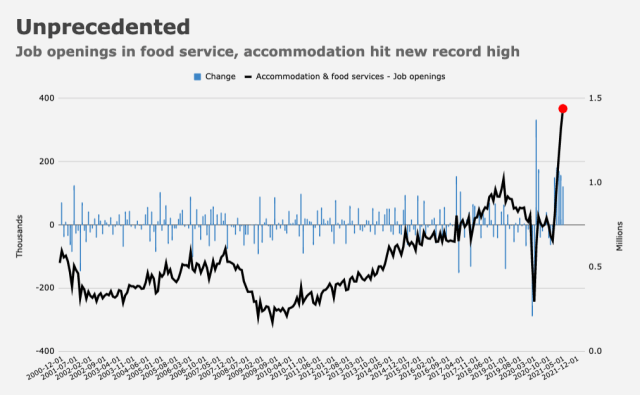US private sector employers added 374,000 jobs in August, ADP said Wednesday.
That was nowhere near consensus. The market wanted 625,000.
The range, from nearly three-dozen economists, was 400,000 to 850,000, so the headline missed even the most pessimistic guess (figure below).
Last month’s reading, which bore no resemblance to the government’s ebullient July jobs report, was actually revised lower (June was upwardly revised).
Once again, market participants are left flying blind into NFP. ADP hasn’t been a particularly good predictor of the government report in the pandemic era. Ostensibly, Wednesday’s numbers didn’t bode well, but you could have said the same thing last month.
Gains in August were concentrated in midsized and large companies, which added a combined 287,000 positions.
The services sector comprised the lion’s share of last month’s increase. Leisure and hospitality hiring picked up, albeit to “just” 201,000 (figure below).
That’s a good number, but not necessarily by the standards of 2021, a year during which the US economy “needs” to add services sector jobs at a breakneck pace in order to help recapture nearly six million “missing” workers who were employed in February of 2020 but who were still jobless as of July.
You might recall that the July ADP report showed leisure and hospitality added the fewest jobs since February. Some worry the spread of the Delta variant and the return of mask recommendations and other containment protocols could further delay a return to normal for the services sector, even as the (looming) expiration of pandemic unemployment benefits is expected to help alleviate labor market frictions (figure below).
Those inclined to a “bad news is good news” interpretation of the data might argue that lukewarm reads on the labor market are preferable at this point, to the extent they keep the Fed cautious. But the problem is that the longer the shortfall to full employment persists, the stronger the argument that wages will eventually have to be ratcheted sharply higher in order to entice workers. That’s good, unless it presages an inflationary spiral or, perhaps more to the point, unless policymakers believe it presages such a spiral.
There were numerous mentions of the Delta variant in Wednesday’s ADP report, which described a “downshift in the labor market recovery.”
“We have seen a decline in new hires,” Nela Richardson, Chief Economist, said, adding that although service providers “continue to lead growth… the Delta variant creates uncertainty for this sector.”
Mark Zandi was more direct. “The Delta variant appears to have dented the job market recovery,” he said. “Job growth remains inextricably tied to the path of the pandemic.”
And monetary policy is inextricably tied to the path of job growth. And around we go.








I was reading some other, less good, daily economic missives and one guy was mentioning people in the leisure and hospitality business hesitating to return to work partly because they’re fed up dealing with ass**es customers.
Incivility and fights, esp. over masks etc., have increased sharply, making customer facing jobs worse than ever. Could this be so widespread as to affect labor supply? Dunno but interesting (though, upfront disclosure, it feeds into my biases against anti-vaxxers and Trumpists/conservatives).
I hate to point this out but one reason 6 million few folks are working than were employed in Feb 2020 is that several hundred thousand have died.
I was in the ‘inflation is transitory’ camp for the last 6 months, but it’s starting to seem that the anti-vaxers/anti-maskers have fundamentally changed the course of events. Rather than the economy getting back to normal by this winter as I had expected last spring, it’s now becoming apparent that won’t happen. So as you mention H, the delay in labor market returning to normal could combine with a longer than expected Fed easing period to create a longer term inflation period than many were expecting. It’s an ironic twist that the very people creating the economic turmoil will also be the first and loudest to squeal when inflation bites us all.
The Atlantic had a good article about the American experience with consumerism from a historical perspective. The article also detailed how we as a society have become far more abrasive (to put it kindly), to those who work in the services sector. Beyond the lousy pay, benefits and not wanting to interact with someone who can make you sick, perhaps the abuse is yet another factor in why jobs remain open.